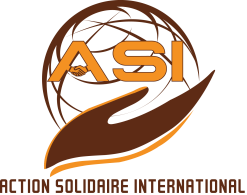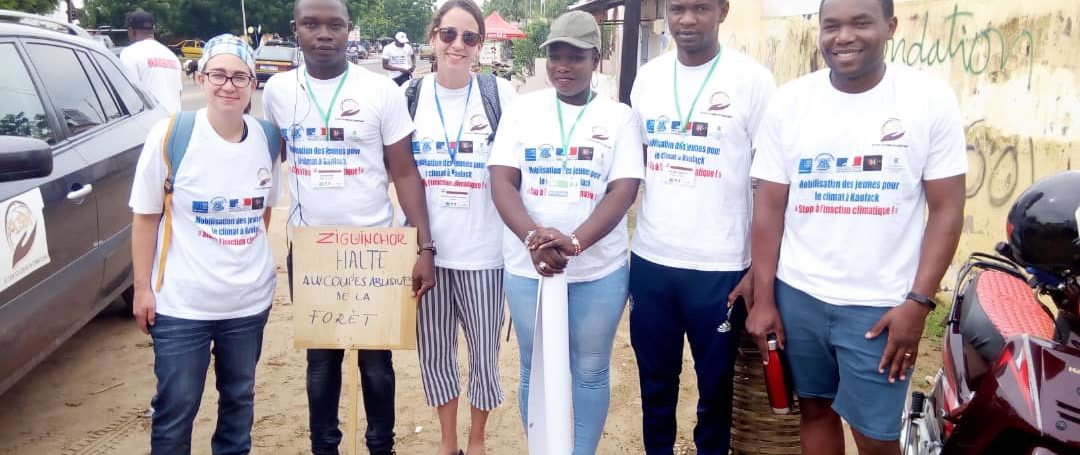Climate Change Clubs Project – 3C Project
Action Solidaire (Solidary Action) International intends to contribute to meeting the challenge of the lack of communication, information, mobilisation, and awareness of young people on the concept and issues related to climate change. To this end, it has initiated the Climate Change Club Project, commonly known as "PROJECT 3C".


Overview of the project
The Climate Change Club project, known as “P3C”, is an initiative that aims to help meet the challenge of the lack of communication, information, mobilisation and awareness of young people on the concept and issues related to climate change. This project aims to promote eco-citizenship and eco-responsibility on the one hand, and on the other hand, to popularise a change in behaviour favourable to the preservation and protection of the environment.
This project is supported by the French Embassy through the Innovative Projects of Civil Societies and Stakeholders Coalition (PISCCA).
P3C operates in twenty (20) localities in Senegal, taking into account the specific environmental characteristics of each project area: Taïba; Joal, Kayar; Pikine, Bargny; Sangalkam; Louga; Linguère; Saint-Louis; Rao; Mbour; Kaolack; Fatick; Kaffrine; Nioro du Rip; Foundiougne; Djilor; Kolda; Ziguinchor; Koussanar
The project was carried out in two phases:
- The first phase, the pilot phase, targeted three (3) localities where the impacts of climate change are more evident
- The second phase will intervene to enroll seventeen (17) other localities targeted by the project. The choice of these localities was made in perfect collaboration with the Centre for Ecological Monitoring (CEM)
The first stage of the project consists of validating the content of the environmental education, or training areas, with the structures concerned such as COMNAAC (National Committee on Climate Change), the Great Green Wall, the States and Forests, the Ministries of the Environment and Sustainable Development, Energy and Renewable Energies, Education, Vocational Training and Higher Education, the Environmental Education and Training Unit of the Ministry of the Environment, and the coordination unit, ANACIM.
Secondly, partnership agreements will be drawn up and signed with the partners involved in the project, such as the ministries of education, vocational training and higher education, and the ministry of youth. The next step is to present and share the project with organisations that have similar initiatives at local and national level in order to identify synergies.
The third step is the implementation of the project, in three phases:
- The phase of setting up the clubs in the different target localities
- The phase of carrying out the activities
- The monitoring phase
The following activities were carried out within the framework of the project:
The organisation of a workshop to launch the project
This ceremony was organised in the presence of the sponsor, Mrs. Mariline DIARRA, Director of the Environment and Classified Establishments (DEEC), project partners, resource persons from various civil society organisations, project focal points (contact people,) and other guests. The objective of this ceremony was to officially launch the project and, more specifically, to present the project to the participants and share the different activities developed by the focal points in the framework of the pilot phase of the project.
The organisation of a training workshop for the focal points
Indeed, the focal points from the twenty (20) localities of the project were trained. The general objective of this workshop is to train and sensitise the focal points of the targeted localities, so that they can share the concepts of CC with the members of the clubs.
The organisation of a workshop to exchange and share
Indeed, following their training, the focal points started to list the different youth associations in their respective localities in order to federate them into a Climate Change Club. Thanks to the knowledge gained, the focal points were able to inform and convince young people during several sessions to share the objectives and concept of the climate change clubs project.
Official installation ceremony of the clubs
Following the mobilisation of young people and authorities around the project, the focal points initiated contacts in their localities to announce the project and set up the clubs. After the establishment of the climate change clubs by the focal points, the Executive Directorate of Action Solidaire International (ASI) conducted a series of official installation ceremonies of the clubs previously set up in each target locality.
The official installation ceremonies took place in plenary in the presence of local authorities (Prefects, Mayors, Village Chiefs, Neighbourhood Chiefs, Imams), authorities from the technical services of the Ministry of the Environment and young club members. It is important to note that at each stage the presence of the sponsors of the clubs, who are resource persons in the field of the environment, who have accepted to participate in the activities of the clubs. It is important to note that at each stage the presence of the sponsors of the clubs who are resource persons in the field of the environment who have agreed to put their experience at the service of young people for useful and important actions for the planet.
Following the installations, each club has an office, with a President at the head and an action plan sent to the Executive Management for validation before its implementation.
A monitoring and evaluation plan has been developed.
The project aims to promote eco-citizenship and eco-responsibility among young people in their communities.
Pilote operation, experimentation
07/2017 - 04/2019
- Forty (40) clubs are set up in twenty (20) localities
- Twenty thousand (20,000) young people in and out of school are trained and sensitised on climate change in twenty (20) localities
- Twenty (20) clubs that are set up form the national platform for reflection, consultation, and action by young people on climate change
- One (1) National Platform of Climate Change Clubs is set up
- Ten multi-stakeholder dialogue meetings are organised with government authorities, parliamentarians, the Economic, Social and Environmental Council (EESC), the High Council of Territorial Communities (HCCT,) and financial and technical partners
- Young people are involved in all sustainable development initiatives in their respective localities
- The climate debate is democratised / more accessible, young people are becoming interested in environmental issues
- Young people from the clubs take part in the major meetings on the climate
The French Embassy in Senegal is the main partner of the 3C Project.
organisation
Action Solidaire International (ASI) is a Senegalese non-profit organisation, member of the Senegalese civil society which was founded in 2008, but started its activities in 2014.
Its mission is to contribute to the creation of wealth for the benefit of communities and to social transformation for a sustainable and inclusive development. The vision of the organisation is to promote the emergence of an eco-responsible citizenship for resilient communities by 2035.
ASI works in the following seven (7) areas:
- Environment, Natural Resource Governance and Climate Change
- Energy and Energy Efficiency
- Agriculture, Fisheries, Forestry and Animal Production
- Education, Training and Youth Integration
- Social and Solidarity Economy
- Territorial Governance and Local Development
- Humanitarian Assistance
In various fields, ASI carries out awareness-raising, training and advocacy activities, and sets up infrastructures for women who process fishery products, among others, such as solar dryers and smokehouses.


